The surprise discovery was made by a team of French and Italian archaeologists during an attempt to find out more about the city's pre-Roman history, following the nearby discovery of a fourth century BC Samnite tomb last year.
The bodies were found in what archaeologists expect was a bronze-maker's workshop and early analysis reveals the remains belong to four young people, including a teenage girl.
“The find was made at Potra Ercolano, an area of the city where artisans used to make and sell their goods,” archaeologist Annalisa Capurso told The Local.

Part of the workshop. Photo: Archaeological site of Pompeii
Experts think the four youngsters had taken refuge in the back of the the workshop as ash and pumice began to rain down on the city during the fatal eruption of nearby Vesuvius.
“We know that the roof of the building didn't collapse during the eruption, so the group probably suffocated as hot ash and volcanic gas filled the shop,” Capurso added.
Near the remains, archaeologists found three gold coins dated 74, 77, and 79 AD and a golden necklace pendant in the shape of a leaf.

One of the coins found near the bones. Photo: Archaeological site of Pompeii
The bones of the four Romans were mixed together in a heap, having been hastily dug up and reburied by looters thousands of years ago.

The grave showed signs of having been disturbed. Photo: Photo: Archaeological site of Pompeii
“In the years after the eruption, Romans used to come to Pompeii and dig out anything they could recycle,” Capurso added.
While the huddling skeletons may have been a surprise find, archaeologists also turned up another Samnite tomb dating to the fourth century BC.
The limestone tomb, found near the workshop, contains the remains of a male individual who was buried alongside six black vases. The contents of the vases is unknown but they were most likely included as a funerary offering to the gods.

A jar found in the grave. Photo: Photo: Archaeological site of Pompeii
Experts will be carrying out more studies in the area over the coming months in the hope they can reveal more about the ancient city.
Pompeii is Italy's top cultural attraction bringing more than 2.5 million visitors each year.



 Please whitelist us to continue reading.
Please whitelist us to continue reading.
Member comments